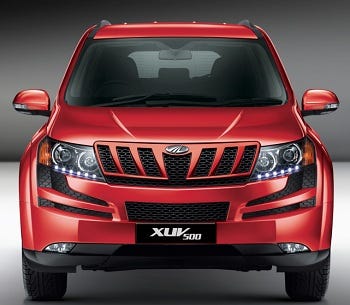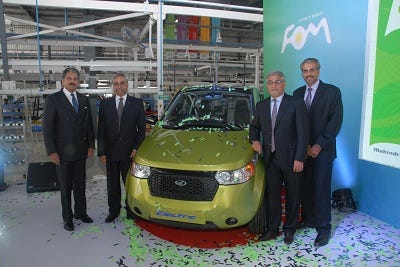India's first injection-molded fenders have hit the road in the XUV500 sports utility vehicle (SUV) manufactured by local automaker Mahindra & Mahindra (Mumbai). The fender was developed with the support of tier I supplier Plastic Omnium (Paris) and Noryl GTX resin supplier SABIC's Innovative Plastics (Pittsfield, MA).
August 24, 2012
India's first injection-molded fenders have hit the road in the XUV500 sports utility vehicle (SUV) manufactured by local automaker Mahindra & Mahindra (Mumbai). The fender was developed with the support of tier I supplier Plastic Omnium (Paris) and Noryl GTX resin supplier SABIC's Innovative Plastics (Pittsfield, MA).
Upgrading from steel to lightweight, online paintable Noryl GTX resin helped Mahindra & Mahindra to improve the SUV's fuel economy, reduce emissions, greatly expand design freedom, improve gap and flush, and enhance resistance against minor impact. The use of Noryl GTX resin for the fenders helps make the global XUV500 one of the lightest SUVs in its class. This SABIC resin, which can be up to 50 percent lighter than steel, reduced the fender weight by 0.9 kg (1.98 lbs.) - a weight savings of 27 percent. The resin is a blend of polyamide (PA) and modified polyphenylene ether (mPPE) which combines the dimensional stability, low water absorption, and outstanding heat resistance of mPPE with the chemical resistance and flow of PA
|
India's first fender made from plastics hits the road in the XUV500 SUV. |
|
From left, Anand Mahindra, Chairman, Mahindra Group, Pravin Shah, Chief Executive, Automotive Division, Mahindra & Mahindra, Rajan Wadhera, Chief Executive - Technology, Product Development and Sourcing (TPDS), Mahindra & Mahindra and Chetan Maini, Chief Technology Officer, Mahindra Reva at the Mahindra Reva Plant Inauguration at Bengaluru on 22nd August 2012. |
The resin gave Mahindra & Mahindra significant freedom to create aggressively flared fenders with accentuated curves and bold lines in line with the XUV500's cheetah-like design. The material helped Mahindra & Mahindra meet customer demand for excellent aesthetics and muscular styling, greater impact strength and anti-corrosion performance.
In day-to-day vehicle operation, Noryl GTX resin's enhanced resilience compared to steel allows the XUV500's fender to flex and absorb energy to regain its original shape, reducing repair costs. Additionally, the design flexibility provided by Noryl GTX resin eliminated the multiple steps, tools and operations that are required to manufacture steel fenders.
Mahindra & Mahindra further benefitted from Noryl GTX resin's high flow performance, a critical requirement for high-quality, large-part molding. Further, the resins' ability to withstand the high temperatures of online painting allowed the fender to be integrated into the production process, while the material's inherent conductivity avoids the need for a conductive primer step.
SABIC has continued to drive the development of better next-generation applications with new conductive Noryl GTX resins that provide a number of critically important benefits. These include cutting coefficient of thermal expansion (CTE) by 20 to 40 percent vs. previous grades for increased dimensional stability and improved gap and flush management, giving automotive designers greater freedom to create larger top-quality, high-precision body panels than previously feasible. The materials are also more easily integrated into existing processes, including ever-increasing high-heat online painting systems. Use of these Noryl GTX resins in larger and more complex fenders and other body panels can make an even greater contribution to vehicle weight-out for reduced fuel consumption and emissions.
Mahindra inaugurate EV plant
In other news at Mahindra & Mahindra, affiliate Mahindra Reva Electric Vehicles (Bengaluru) officially inaugurated its new factory in Bangalore for electric vehicle manufacture. Capable of producing 30,000 cars per year, the plant is scheduled to begin production in September 2012.
Mahindra Reva also showcased several technologies at the inauguration, including Quick2Charge, by which a car can be charged in 15 minutes to run a distance of 25 km, thereby providing customers with increased convenience. In order to tap and use the abundant solar energy for mobility, Mahindra Reva has also designed a personal charging unit called Sun2Car which will provide free and clean energy for the lifetime of the car. Finally, the technology Car 2 Home makes it possible to use energy from the car to power a house.-[email protected]
About the Author(s)
You May Also Like




